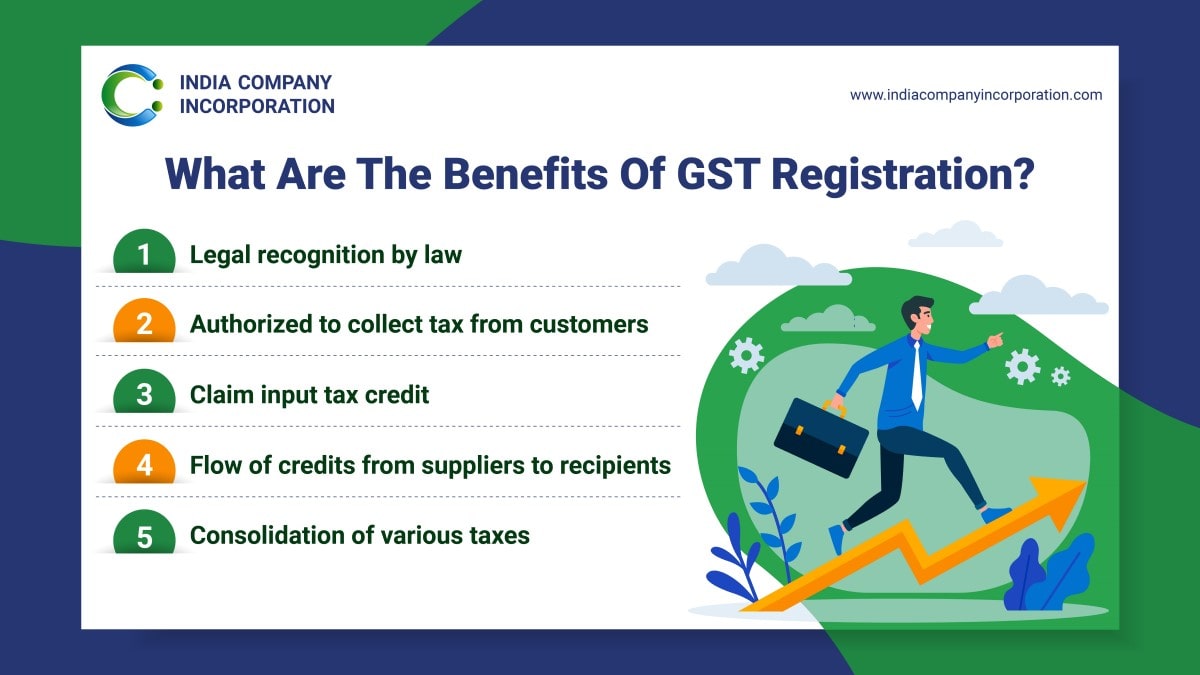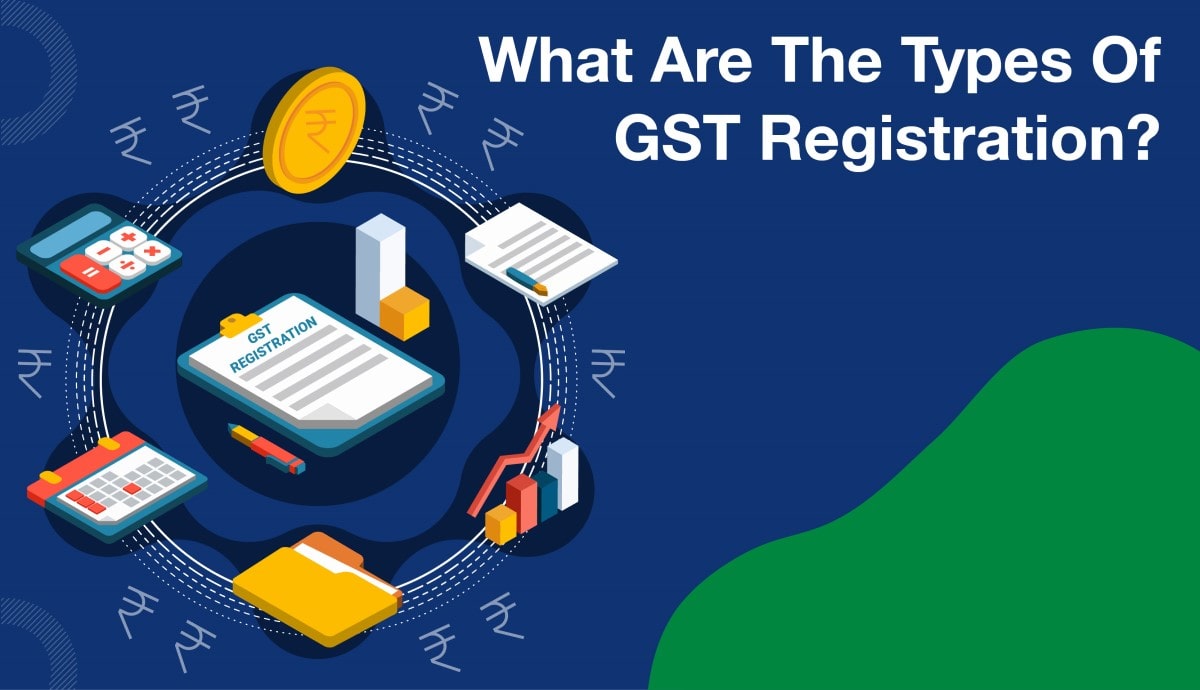The Goods and Services Tax (GST) reform impacted Indian agriculture, industry, manufacturing, and service sectors. The Goods and Services Tax is one of the most significant tax reforms in Indian history. In this article, we’ll go over GST, its benefits, and types of GST registration.
In July 2017, the Indian government passed the Goods and Service Tax (GST) Act. GST is a multi-stage, destination-based tax that is imposed in India on all value additions. Let’s look at what you need to know about GST.
Table Of Contents
An Overview
Who needs to register for GST?
What are the benefits of GST registration?
What are the different types of GST registration?
What does voluntary registration mean?
What is the process of GST Registration?
Conclusion
How can we help you?
What Is GST?
All service providers, retailers, wholesalers, and producers doing business in India are subject to GST. Several central taxes, including service tax, excise duty, CST, and state taxes, such as entertainment tax, luxury tax, octroi, and VAT, have been merged into a single tax known as GST.
This will simplify tax collection, reduce double taxation, and improve the efficiency of the process. It will also result in India having a single, uniform tax structure. Furthermore, the ultimate GST tax is the responsibility of the purchaser.
Who needs to register for GST?
- Business organizations must register under the GST Law to obtain a unique number from the tax administration to collect taxes on behalf of the government and claim an input tax credit (ITC) for taxes paid on inward supplies.
- GST registration is essential for any organization or entity that buys and sells goods or services. Firms with a yearly turnover of more than Rs. 20 lakhs (for services) and Rs. 40 lakhs (for goods) are required to register for GST. To help you understand the threshold restrictions better, here is a table –
Business Activity Aggregate Turnover (For Normal Category States) Aggregate Turnover (For Special Category States) Dealing in Goods 40 Lakhs 20Lakhs(1) 10Lakhs(2) Providing Services 20 Lakhs 10Lakhs(3) Deals in both goods & services 20 Lakhs 10Lakhs(3) (1) Special Category States – States of Arunachal Pradesh, Meghalaya, Sikkim, Uttarakhand, Puducherry and Telangana
(2) & (3) Special Category States – States of Manipur, Mizoram, Nagaland and Tripura
Save time, save money by calculating GST on our free online calculator
Note – On a pan-India basis, the total turnover is calculated. The threshold limit will be calculated by adding the turnover of both units if you have two units in two distinct states.
- Businesses that export products across state lines must additionally register for GST. The same restrictions apply to businesses that make taxable supplies on behalf of other taxable people, such as Agents and Brokers.
- Even if their total sales are less than Rs.20 lakhs, e-commerce sellers/vendors must register.
Related read: Beginners Guide To Start Your Own E-Commerce Business!
What are the benefits of GST registration?
The following are some of the benefits of GST registration:
- Legal recognition by law.
- You are authorized to collect tax from its consumers.
- You can claim tax deductions for paid purchases.
- Multiple taxes, such as excise, service tax, and VAT, are replaced by single compliance.
A person who is not registered is unable to collect taxes from consumers or claim an input tax credit (ITC) for taxes paid.

What are the different types of GST registration?
GST registrations are divided into two categories, which are described below:
- When a person’s income exceeds the amount mentioned above, they must register under the normal scheme. A person must file GST returns monthly or quarterly under this structure (depending on their turnover).
- A registered person under the composition scheme cannot charge tax to clients or claim ITC on purchases.
- They must pay the government a set percentage of their revenue in the form of GST. Payment must be received by the 18th of the month after the quarter’s end.
Related read: An Overview On GST And 5 Ways GST Impacts Your Business
What does voluntary registration mean?
The law does not restrict you from registering your business under the GST Act if you do not fall into any of the above categories.
Registering for GST will benefit you in the following situations:
- Assume you’re buying something from a GST-registered retailer. The invoice he sends you will include a GST component. Because you are not registered, you will not be able to claim GST, which will be added to your costs. As a result, your total purchasing costs will be higher than your peers’.
- If you want to grow your company, you can choose the composition scheme. There are fewer regulations to follow and fewer taxes to pay.
- After you’ve enrolled, it’ll be considerably easier to get a bank loan.
Voluntary registrants will be subject to all GST regulations.
Further apart from the above, GST law has provisions for the following category of registrations:-
- Casual Taxable Person
- Input Service Distributor
- Non-Resident Taxable Person
- Non-Resident Online Service Distributor.
- Embassy/UN Body/ Other Notified Persons.
- Special Economic Zone (SEZ) Developer/ Unit
What is the process of GST Registration?
In a few simple steps, we will secure a GSTIN for your business:
- Contact our GST team of experts, who have a wide range of expertise and understanding in the field of GST registrations.
- To register, please send all of the relevant paperwork to our team.
- After you’ve submitted your application, our team will upload it, along with your supporting documents, to the online GST registration platform.
- The portal will create your Application Reference Number (ARN) once your documents and application have been approved.
- Finally, you’ll get your GSTIN number easily and quickly.
Conclusion
A GSTIN number is required for everyone who wishes to create or operate a business. GST registration enables your company to function lawfully and defines your brand as one that others can trust.
How can we help you?
There are many challenging and complex fields on the GST registration forms. It is strongly recommended that you hire a professional to help you apply, complete the necessary procedures, file your returns, and fulfil other portal requirements.
Our team of experts will advise you on whether GST is applicable to your business and what compliance standards you must meet, as well as assist you with registering for GST.
Our service scope includes:
- Application for GST registration
- GST Advisory
- Assistance with GST Filing
- Application for GST Registration For Foreigners
- Assistance with GST Refund
Frequently asked question
All GST returns filed by registered persons must be audited, according to the GST law. GST audits involve checking the accuracy of a registered person's records, returns, and other documentation to ensure that the turnover, taxes paid, refund claimed, and input tax credit claimed are accurate. It will also examine their compliance with the GST Law.
GST audits are available to taxpayers whose total turnover in a given financial year exceeds Rs 5 crores on an all-India basis.
Once a GST return has been filed, it cannot be changed. Corrections to previously filed returns, on the other hand, can be made in subsequent GST filings. Such corrections must be completed before the return filing deadline in September of the following year or the annual return filing deadline, whichever comes first.
GST Advisory is required on -
- Assessing the GST's fiscal impact on businesses
- Reconfiguring processes to maximise tax efficiency
- GST rate applicable on products and services
- Correctly claiming GST credits and utilisation thereof
- Assessment refund and appeal matters
- Implications under the anti-profiteering provisions under the GST laws.
